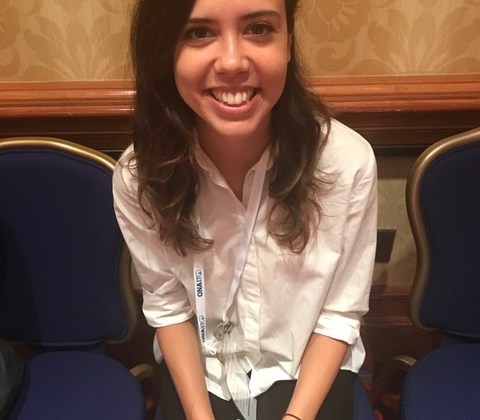As a child, I remember my family constantly trying to beat time.
During a typical weekend when I was a kid, my parents would rush us from my own soccer game to my older brother’s games to my twin little sisters’ games to church or Girl Scouts or other sports activities.
Since my dad was always my coach, he would typically drive me to my games, driving well over the speed limit because we always left 20 minutes late. My mom was the team manager, and she would slowly make her way to the game, after coercing my little sisters to get ready and gathering any paperwork left behind.
Back then, my life revolved around a structured schedule, and a typical day was filled with activities.
In charge of my time for the first time
Entering college in 2014, I controlled my own schedule for the first time. But I found out that entering a new environment where I had to recreate my identity ignited some deep personal fears. I was afraid of being alone and feeling incompetent, which I tried to hide by leaving no time in my schedule to think.
I was still constantly running, attending six classes (18 credit hours), working 25-30 hours a week and dedicating the rest of my time to volunteering and planning social events for my dorm.
I used to cherish eating meals with friends, but now I ate out of “to go” boxes while walking to commitments. My long nights of homework led to a constant cup of coffee in my hand.
Despite pushing myself to breakdowns, I never realized I could slow down or practice self-care. Whenever I became aware of them, moments of silence haunted me with twinges of guilt to do something.
Three experiences challenged me to rethink this constant cycle of self-denial.
Having too much fun
The first experience was in the summer of 2016, before my junior year, when I studied abroad in London for five weeks. Following a semester with the hardest workload I had ever taken, my schedule changed from studying over 10 hours a night to taking only three hours of classes a day.
While I enjoyed the communications classwork, I constantly felt guilty that I was spending so much money to be abroad and having too much fun going to street markets, book shops and museums.
This routine seemed selfish to me, and having been raised in a Catholic family, selfish actions seemed wrong. Toward the end of the trip, I had fallen into a depression and couldn’t enjoy the adventures that I had worked into my days. This was the first time I realized my discomfort with leisure time.
Returning to school in the fall, my busy schedule continued, picking up speed until the spring break of my junior year in 2017. I took a family road trip throughout the northeast, which gave me many hours a day to reflect. This idle time stressed me out.
During these long hours, I felt lost, and I didn’t know how to fill the void in my schedule. I realized I was disconnected from my faith, I had lost any sense of my relationships with friends and family, and I felt a constant sense of anxiety.
Valuing family time
It was at this point that I made a commitment to focus on myself, and I sought the support of professional help and friends to guide me in a direction that I had not yet tried.
With summer on the horizon, I knew I’d have time to slow down. I wanted to have a better study abroad experience, and with the support of a faculty member who believed in me, I decided to return to London in the summer of 2017. I served as that professor’s program assistant for the month of June. Then I stayed in London to intern at another study abroad program until August.
At first, I kept busy, wandering the city and trying to experience as much as I could. I still faced some fear about not knowing myself well enough to know what I enjoy in my free time and feeling this constant pressure to be doing something “productive,” whatever that meant.
Once when we traveled to Scotland, I asked one of the locals why everything closed after 5 p.m. He told me that unlike Americans, the Scottish valued their family time and free time, and they wouldn’t labor any more than they needed to pay their bills.
In my life, work always came first
This was something new to me. I realized I believed that a person’s work toward success always came first—even if that replaced family dinners or social events.
And reflecting on my life back home, I saw that it wasn’t just me. I notice it in other people when I see Americans introducing themselves by their professions rather than their passions.
Shortly after this trip, two close friends who had been abroad with me returned to the states, and I faced my lowest point of the summer: feeling completely alone and feeling unsure of how to move forward.
After my turning point during spring break, I did know one thing: I needed to focus my time to care for myself.
I started adding balance in my life, going on runs and walking to and from work. These were steps (quite literally) in the right direction, although these healthy activities still seemed “productive.”
I could tell something had changed after watching my London flatmates come home from our internships and watch Netflix. I started occasionally watching a movie or going to bed early, which was something that I tried not to feel guilty about doing.
Looking forward to relaxation
Eventually, I felt my stress levels decrease, and I started looking forward to these moments of relaxation and the occasional night of solitude in my room.
Returning to school this year, I’ve built time into my schedule to go on a run or having a wine night to reconnect with my friends. It’s important to me to pause and laugh and take a step away from the rush of life.
As a result, I feel more confident, knowing that there is more to my life than my day-to-day stresses.
I still feel stressed out sometimes when I’m faced with days crammed with meetings after meetings, deadlines after deadlines.
However, I’ve let go some of the power that my commitments hold over me. When I make time for myself, my value and worth are no longer dictated by my work life. It’s dictated by me.






